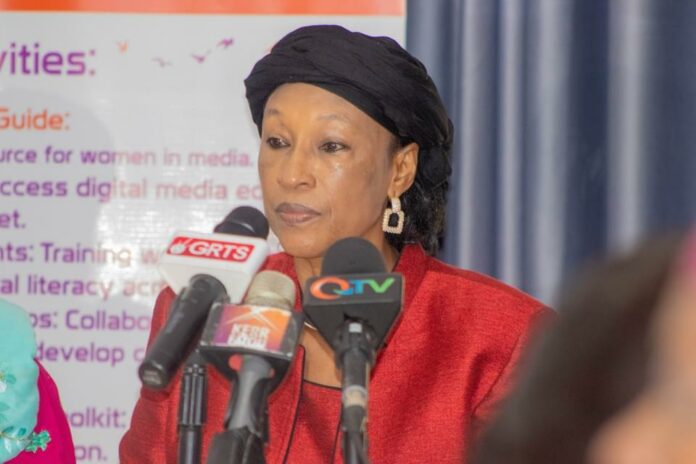By: Michaella Faith Wright
Nenneh Macdooll Gaye, Chairperson of the Access to Information Commission, highlighted the pivotal role of media and information in advancing gender equality in The Gambia at an event organized in partnership with the Media Academy for Journalism and Communication (MAJAC). Addressing participants, she emphasized the power of media in fostering social change and empowering young women.
At the event, Gaye commended MAJAC for securing an initiative focused on empowering young women in the media through information literacy training. “Your work in developing journalism in The Gambia is commendable and critical to the nation’s progress,” she noted.
Gaye’s speech focused on Harnessing the Power of Media and Information for Gender Equality in The Gambia, where she stressed that gender equality is a fundamental aspect of any nation’s development. “We all recognize that gender equality is not only a human right but also a driver of sustainable development,” she stated.
She explained how gender equality contributes to society by promoting equal access to education, healthcare, financial resources, and social support. “When we ensure equal opportunities for men and women, we strengthen communities and foster economic growth,” she added.
Highlighting the positive shifts in attitudes toward gender, Gaye cited educational statistics, such as the 2024 West Africa Senior School Certificate Examination (WASSCE), where more female candidates achieved five credits than their male counterparts. “This reflects the positive changes in attitudes toward women’s education,” she remarked.
Despite the progress made, Gaye pointed out the persistent challenges, including gender-based violence, political underrepresentation, cultural biases, and economic inequality. She stressed that while media has played a significant role in raising awareness of these issues, there is still much work to be done.
She praised the growth of female representation in the media, especially the contributions of the Gambia Women Journalists Association (GWJA), which has actively worked to promote gender equality in the industry.
Gaye emphasized the importance of using the media as a tool for education and awareness. “The media can influence policies, shape public perception, and break down gender stereotypes,” she said. She urged media practitioners to continue using their platforms to champion gender equality and ensure that women’s voices are heard in all sectors of society.
Concluding her address, Gaye updated the audience on the Access to Information Commission’s progress, announcing plans to establish a secretariat to make the commission fully operational. “Access to information is a human right recognized under international law, and it plays a crucial role in promoting good governance and fighting corruption,” she said.
Gaye ended by encouraging the media to strategically harness its power to advocate for gender equality and empower women across The Gambia.




